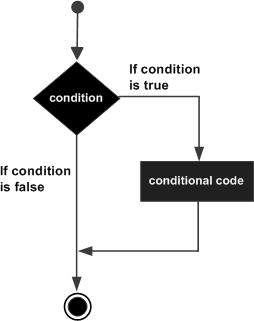
- Go 教程
- Go - 主页
- Go - 概览
- Go - 环境设置
- Go - 程序结构
- Go - 基本语法
- Go - 数据类型
- Go - 变量
- Go - 常量
- Go - 运算符
- Go - 决策
- Go - 循环
- Go - 函数
- Go - 作用域规则
- Go - 字符串
- Go - 数组
- Go - 指针
- Go - 结构体
- Go - 切片
- Go - 范围
- Go - 字典
- Go - 递归
- Go - 类型转换
- Go - 接口
- Go - 错误处理
- Go 有用资源
- Go - 问题与解答
- Go - 快速指南
- Go - 有用资源
- Go - 讨论
Go - if 语句
一个 if 语句包括一个布尔表达式,后跟一个或多个语句。
语法
一个 if 语句在 Go 编程语言中的语法为 −
if(boolean_expression) {
/* statement(s) will execute if the boolean expression is true */
}
如果布尔表达式被评估为 true,则将执行 if 语句中的代码块。如果布尔表达式被评估为 false,则将执行 if 语句结束后的第一组代码(在结束大括号后)。
流程图

示例
package main
import "fmt"
func main() {
/* local variable definition */
var a int = 10
/* check the boolean condition using if statement */
if( a < 20 ) {
/* if condition is true then print the following */
fmt.Printf("a is less than 20\n" )
}
fmt.Printf("value of a is : %d\n", a)
}
在编译并执行以上代码时,它生成了以下结果 −
a is less than 20; value of a is : 10
go_decision_making.htm
广告